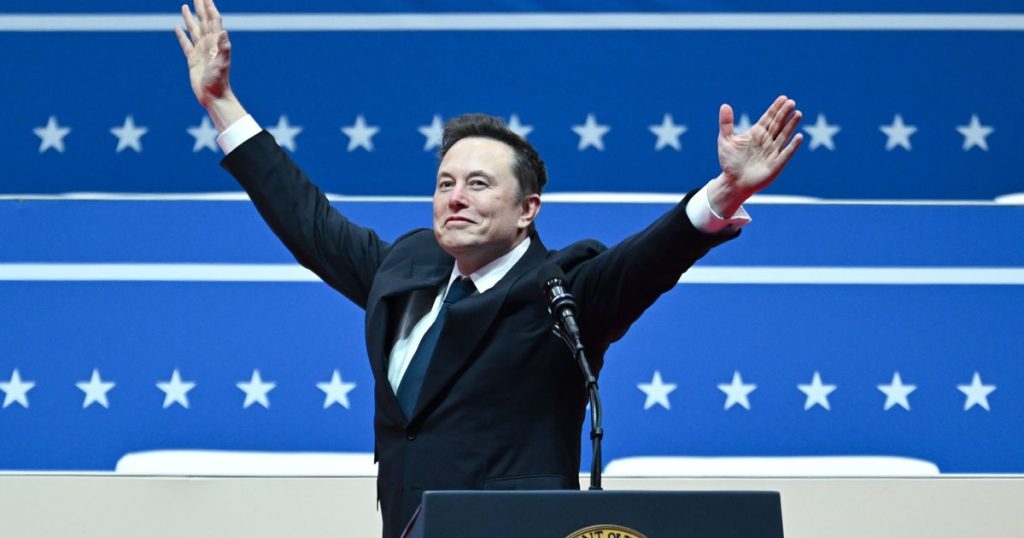Elon Musk Rehires Staff Member Amid Controversy Over Racist Social Media Posts
In a dramatic turn of events, Elon Musk announced on Friday that he would rehire a staff member at the Department of Government Efficiency (DOGE) who had resigned just a day earlier. The staffer, Marko Elez, stepped down after The Wall Street Journal linked him to a now-deleted social media account on Musk’s platform X that contained posts espousing racist and divisive views. Among the controversial posts were statements like, “I was racist before it was cool,” “You could not pay me to marry outside of my ethnicity,” and “Normalize Indian hate.” The latter post was particularly unsettling given that Usha Vance, the wife of Vice President JD Vance, is the daughter of Indian immigrants. Despite the disturbing nature of these posts, both Vice President Vance and President Donald Trump publicly endorsed rehiring Elez, framing the situation as a matter of forgiveness and redemption.
Musk’s decision to bring Elez back was met with mixed reactions. The billionaire entrepreneur, who has been a vocal advocate for free speech, tweeted, “He will be brought back. To err is human, to forgive divine.” This stance aligns with Musk’s broader philosophy of giving people second chances, but it also raises questions about accountability for offensive behavior, especially in a professional context. Elez’s resignation on Thursday had come swiftly after The Wall Street Journal uncovered the problematic posts, which were tied to an account previously linked to his name. The 25-year-old staffer had also been involved in another controversy earlier in the week, along with a colleague, when they accessed the U.S. Treasury Department’s payment system, prompting a court challenge and a judge’s decision to restrict their access.
Vice President JD Vance Leads the Charge for Elez’s Reinstatement
Vice President JD Vance was quick to rally behind Elez, arguing that the young staffer’s mistakes should not define his career. In a post on X, Vance wrote, “I obviously disagree with some of Elez’s posts, but I don’t think stupid social media activity should ruin a kid’s life.” Vance’s defense of Elez was not without irony, given that one of the offensive posts targeted people of Indian descent, a community to which his own wife belongs. Vance’s wife, Usha, is the daughter of Indian immigrants, and while she has not publicly commented on the situation, her heritage adds a personal dimension to the controversy. Vance’s stance seems to reflect a broader conservative narrative that emphasizes personal responsibility while also decrying what many on the right perceive as an overly punitive culture in the media and beyond.
President Trump, never one to shy away from controversy, quickly echoed Vance’s sentiments. During a news conference on Friday, Trump stated, “I’m with the vice president,” signaling his support for rehiring Elez. Trump’s endorsement further polarized the debate, as critics accused him of downplaying the seriousness of Elez’s actions. The White House, for its part, did not immediately confirm whether Elez had been officially rehired, though it did acknowledge his resignation earlier in the day. The administration’s cautious response suggests that there may have been internal deliberations about how to handle the situation without further inflaming public opinion.
The Broader Implications of the Controversy
The controversy surrounding Marko Elez raises important questions about the boundaries of free speech, the consequences of online behavior, and the responsibilities of public figures. On one hand, Musk, Vance, and Trump frame Elez’s rehiring as an act of mercy and a rejection of what they see as an overly censorious culture. On the other hand, critics argue that rehiring someone who expressed such overtly racist views undermines efforts to promote inclusivity and accountability, particularly in government roles. The fact that Elez was involved in two separate controversies—accessing the Treasury Department’s payment system and posting offensive content—further complicates the issue.
This incident also highlights the challenges of navigating the intersection of personal and professional lives in the digital age. Social media platforms like X, which Musk owns, have become spaces where individuals often blur the lines between private opinions and public statements. While Musk has positioned himself as a champion of free speech, his decision to rehire Elez suggests that he is willing to extend leniency to those who cross the line into hate speech, as long as they show remorse or receive support from influential figures. This approach has drawn criticism from those who believe that public officials and employees should be held to higher standards of conduct, both online and offline.
The Role of Media and Public Reaction
The media played a crucial role in bringing Elez’s social media activity to light, with The Wall Street Journal reporting on the deleted posts and linking them to his professional identity. Journalists have faced pushback from Vance and others who accuse them of engaging in “cancel culture” by amplifying stories about individuals’ past mistakes. Vance’s accusation that “journalists who try to destroy people” are at fault for Elez’s downfall reflects a broader tension between the media’s role in holding public figures accountable and the perception that reporters are overly eager to tarnish reputations.
Public reaction to the situation has been predictably divided. Supporters of Musk, Vance, and Trump have rallied around Elez, framing his rehiring as a victory for free speech and personal redemption. Critics, on the other hand, have expressed outrage over what they see as a failure to address racism and hate speech adequately. The debate has also sparked discussions about the responsibilities of employers in addressing offensive behavior by employees, particularly in the public sector. While some argue that individuals deserve second chances, others believe that certain actions, especially those that promote hate, should have consequences that extend beyond mere resignation.
The Uncertain Future of Marko Elez and the Broader Implications
As of now, the exact status of Marko Elez’s employment remains unclear, as the White House has not confirmed whether he has officially been rehired. However, the broader implications of this controversy are undeniable. The decision to bring Elez back sends a signal about the values of the administration and the companies under Musk’s leadership. While some may view it as an act of compassion and a rejection of knee-jerk outrage, others see it as a missed opportunity to take a stand against racism and hate speech.
This incident also underscores the challenges of navigating the complexities of online behavior in an increasingly digital world. As social media continues to shape public discourse, the question of how to balance free speech with accountability for harmful behavior remains unresolved. The case of Marko Elez serves as a reminder that words have consequences and that the line between personal and professional conduct is often blurred in ways that can have far-reaching effects.
In the end, the decision to rehire Marko Elez reflects a larger cultural debate about forgiveness, responsibility, and the limits of acceptable behavior. While Elon Musk and his allies may see this as a triumph of compassion over cancellations, critics warn that it sets a dangerous precedent for downplaying the impact of racist and hateful rhetoric. As the conversation continues to unfold, one thing is certain: the intersection of social media, politics, and personal accountability will remain a contentious and deeply human issue for years to come.









